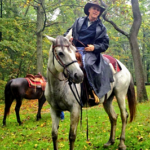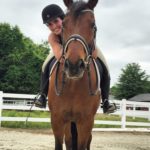Continued from Married with Horses: Tough Guys
Long-term relationships with horses can approach something that mimics married life. You have your routines–some you look forward to and others you barely think about.
I look forward to our weekend trail rides, but I can fill the morning buckets while I’m still half asleep. I love listening to the radio while taking my time to muck the stalls, but I can scrub the water troughs while pondering something else entirely.
And like any other long-term relationship, there’s a safe and comforting familiarity. I’m perfectly at ease entering our horses’ stalls and moving around them as they eat or rest. They’re my good friends and mucking around them is like a dance. I enter the stall with my bucket and rake and they step to the side without missing a bite of hay. I scoop underneath them and they step back or lift a leg to accommodate my cleaning.
Then it’s grooming time. With each horse it’s the same choreography. I grab the brush and start with the neck. They step forward as I finish the neck, putting their backs within my reach. A few moments later they step forward again to make sure I get any mud on their flanks. Then we switch sides and start the dance again.
I’m also comfortable riding our horses. So much so I can almost go to sleep during our trail rides as we follow the paths through the fields and woods behind our home. Subsequently, I’ve forgotten what it’s like to ride a new horse or how to approach equines with whom I don’t have a relationship. It’s completely different when you don’t know their quirks, moods, preferences, if they like to bite you while you’re tacking up, or if they’re just affectionately mouthy.
A recent experience reminded me exactly how wonderful it is to have those familiar, trusting, long-term relationships with our horses. If I ever have, I’ll never again take those relationships for granted.
Earlier this year, Kimberly’s parents gave us one of their timeshare weeks to use wherever we wanted. Completely overwhelmed, I stared at a world map thinking of all the places we could go. There are so many places we’ve never seen, but we had to narrow down our options. OK, Rwanda and east Congo were probably out. Iran was out. North Korea could probably be crossed off, too. “Good,” we figured. Maybe we were making some headway.
We were able to cross off at least 98 percent of the remaining destinations once we started researching the plane fares. We could build a fancy new barn for what it would have cost us to travel to some countries. France: Out. Kenya: Nope. Thailand: Sorry.
Strangely enough, we knew we wanted to ride horses wherever we went. Isn’t that sick? Maybe just a little.
Costa Rica was affordably reached and had plenty of horseback riding, so Costa Rica it was. We booked our trip, packed, kissed the animals and waved “goodbye” to our caretakers supreme, Jack and Claudia.
We realized shortly after arriving that Costa Rica is not for the average, pampered American. The roads are dangerous because of the aggressive drivers and the rampant potholes. Some cities are dangerous because of pickpockets and the indifferent police officers. The beaches are dangerous because of the stingrays or riptides-and no, there are no posted signs to warn you about any of this.
During our stay, we didn’t wreck our rental car. We weren’t mugged. And we didn’t fall victim to any dangers of the sea. I figured we were home free when, near the end of our stay, we arrived at Rincon de la Vieja national park for our day of horseback riding, whitewater tubing and a canopy zip line tour.
We were part of a 10-person group, and as each person arrived we were given a horse and a helmet. The way the horses were assigned seemed somewhat arbitrary. No one was asked about their horseback riding ability, but simply paired up with whatever mount seemed to match their height or body type. It took a while for everyone to arrive and sign the waivers, which were in Spanish. (I can only imagine what rights we signed away.) I was one of the first to be given a horse, and I climbed on. The Costa Rican horses are strangely narrow. I felt like I was balanced atop a large, wooden saw horse. Additionally, my horse was so calm he could have been asleep.
I’d been on an organized horseback ride before. On that ride, the horses knew the trails and simply plodded along for an hour or so with the riders on their backs until the trails led everyone back to the barn. No amount of rain, noise or prodding would alter the horses’ pace. It was a little boring, but definitely safe for anyone. This was what I was expecting of this ride, too.
My mount had other ideas–other deranged, depraved and psychotic ideas. The instant the ride began I regretted signing the waiver.

My horse burst out of the open gate, nearly knocking down several of the other horses and riders. It was the rainy season in the northwestern region of Guanacaste, but my horse thought sprinting through the foot-deep mud was a good idea. He nearly fell down, which only seemed to make him more violently disturbed. I pulled back evenly on the reins with a calm but firm “whoa.” He just threw his head around and sped up as we entered the woods.
We had left behind the deep mud, but also the entire tour group. I can only imagine what Kimberly was thinking. She and I were the only two on this tour with any riding experience. I would have been seriously worried if anyone else–including Kimberly–had been given my horse instead.
My horse and I zipped across wet rocks as we approached the first of two rivers. He stumbled again, and I pulled his head as hard as I could to the right side. He made a few quick clockwise circles and pulled against the knotted rope rein. He snorted and nipped at my ankle but I didn’t let go until he was standing still. The instant I eased up on my grip, he bolted. His feet were unsteady and slipped on the smooth, wet rock. Again I cranked his head against my leg. He stopped. I let go of the rein, but this time he actually stood still until the first tour guide rode up.
“That’s a fast horse,” he said in Spanish. “You like him?”
“Not yet,” I responded in my version of Spanish. “What’s his name?”
“Crazy Chicken.” he said.
“Crazy Chicken? Really?” I asked.
“Sí, señor. Pollo Loco.”
I didn’t have time to ponder the implications of riding a horse with such a name before said horse bolted toward the river. I’m sure there was a safe way to cross the swiftly moving water, but this was not it.
Mr. Chicken leapt into the deepest part of the river. The water was moving fast and nearly came up over the saddle. I could hear his feet clicking on the large river rocks beneath us as he struggled to get a foothold. His thrashing churned up a cappuccino-like froth as we were slowly pushed downstream. I was considering taking my chances alone in the water when his rear legs found a stable spot and he jumped from the water onto the bank. We landed a little sideways and I lost the reins, but I gripped him with my legs as he sprinted up a treacherously rocky hill and into another section of woods.
After only a short distance, the path through the trees narrowed considerably. Despite Pollo Loco’s narrow build, we had only an inch or two on either side as we zipped through the trees.
Now there’s something I need to clarify here. This was a forest of Pochote trees. You really need to look this tree up. The Pochotes vary in size, though most in this area were about 25 or 30 inches around. And like all Pochotes, they were literally covered in short, sharp spikes. Spiky trees will liven up even the most boring trail ride. This ride on Pollo Loco was no exception.
The ground was muddy and rocky, and though Crazy Chicken was almost galloping, I had no chance of cranking his head around without possibly killing both of us. For the first time during the ride, I was mildly nervous. I offered a firm but calm “whoa” as I pulled back on the reins. There was no response and no slowing. I tried again, but to no effect. I was eyeing a clearing up ahead when he ran us into a large Pochote tree. He raked his side, but it was the impact of my knee and forearm that brought me and the giant, sprinting chicken to a complete stop. I was immediately shocked by how much pain I was in. I took a deep breath and looked at the blood running from the punctures on my arm and leg.
He was about to take a step forward, but I yanked his head around so fast that for the first time during the ride I had his full attention. He stood still. I was almost unable to comprehend how much pain I was in. Seconds after the impact with the Pochote my knee was a swollen, blue-and-purple, bloody mess. I took another deep breath and exhaled slowly before giving him a gentle tap with my heels. He walked calmly though the second river. This crossing was deep, but much calmer than the first. The ice-cold water covered my throbbing knee and relieved some of the pain. I stopped him right there in the river.
After a short while with my knee in the water, I gently asked him to continue. He didn’t even try to run as we climbed the next hill and arrived at the camp where we would trade our horses for canvas-covered inner tubes. I eased myself off of Pollo Loco and tied him to a small Pochote tree.
“Watch those spikes,” I said to him. Mr. Chicken just closed his eyes and stood motionless, ready to sucker in the next rider with his benign appearance.
I spent much of the whitewater inner tubing without my tube, and most of the zip line canopy tour hanging upside down from rusted or flimsy-looking clips and cables. At least the cold water helped my knee, and I know the dangerous canopy tour took my mind off the pain.
I felt like I was 102 years old when I awoke the next morning. We drove to Liberia airport, where I was sure that security would want to check my giant knee for contraband. Fortunately, I was left to hobble to my seat on the plane where I slept until we landed in the States.
When we arrived home, I limped out to the barn. Our familiar horses were in their stalls. I hugged them and Kimberly, and I turned the horses out.
The next morning things were improved. I only felt like I was 101 years old. My knee ached, but not too much to keep me and Kimberly from going on a trail ride. It was a wonderfully calm trail ride with no head-tossing, no falling in the mud, no running on wet rocks and, most importantly, no crashing into spiky trees.
After the ride, I brushed Ellie starting with her neck. Then she stepped forward, and I brushed her back and sides before she moved forward again so I could reach her hind end. We then switched sides and repeated our moves. When we finished our familiar dance, I bowed to her as best I could.
I am well aware of how lucky I am. I was smiling and only feeling about 90 years old as I walked back to the house. With our horses help I’ll be 35 again in no time.
Jeremy Law and his wife, Kimberly, live on a small farm in North Carolina.
Read Jeremy’s other columns in EquiSearch.com’s Humor section, and share your comments in the forum.







